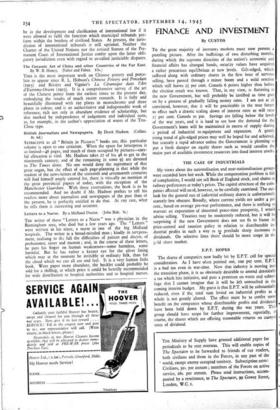FINANCE AND INVESTMENT
By CUSTOS
To the great majority of investors markets must now present a puzzling picture. After the buffetings of two disturbing months, during which the supreme direction of the nation's economic and financial affairs has changed hands, secur:ty values have acquired a rather precarious equilibrium at new levels. Gilt-edged, which suffered along with ordinary shares in the first bout of nervous selling, have passed through a minor boom and a mild reaction which still leaves 21 per cent. Consols 6 points higher than before the election result was known. That, in my view, is flattering to the new Government, but will probably be justified as time goes on by a process of gradually falling money rates. I am not at all convinced, however, that it will be practicable in the near future to effect such a drastic scaling down of interest rates as will raise 24 per cent. Consols to par. Savings are falling below the levels of the war years, and it is hard to see how the demand for the Government's loans will be maintained in excess of supply during a period of industrial re-equipment and expansion. A gently rising trend of gilt-edged prices may well be hoped for and achieved, but scarcely a rapid advance unless the Government is planning to put a fresh damper on equity shares such as would canalise the major part of avairable investment .resources into fixed interest stocks.
THE CASE OF INDUSTRIALS
My views about the nationalisation and near-nationalisation groups were recorded here last week. While the compensation problem is full of complexities, I would not sell Bank of England stock, Coal shires or railway preferences at today's prices. The capital structure of the com- panies affected will need, however, to be carefully examined. The out- look for the general run of industrial ordinary shares is unfortunately scarcely.-less 'obscure. Broadly, where current yields are under 4 per cent., based on average pre-war performance, and there is nothing to warrant an expectation of abnormal peace-time prosperity, I would advise selling. Taxation may be moderately reduced, but it will be surprising if the new Government does not see fit to frame its price-control and taxation policy in relation to distributable in- dustrial profits in such a way as I preclude sharp increases in dividends. On selective lints there should be more scope. in the gold share market.
E.P.T. HOPES
The shares of companies now badly hit by E.P.T. call for special consideration. As I have often pointed out, zoo per cent. E.P.T. is a bad tax even in war-time. Now that industry is moving into the transition phase, it is so obviously desirable to amend drastially a tax which hits initiative, and puts a premium on waste and subter- fuge that I cannot imagine that it will be left untouched in the coming interim budget. My guess is that E.P.T. will be substantially reduced, even if the total sum levied on industrial profits as a whole is not greatly altered. The effect must be to confer some benefit on the companies whose distributable profits and dividends have been held down by E.P.T. during the war years. This group should have scope for further improvement, especially, of course, the shares which are offering reasonable returns on current rates of dividend.


























 Previous page
Previous page